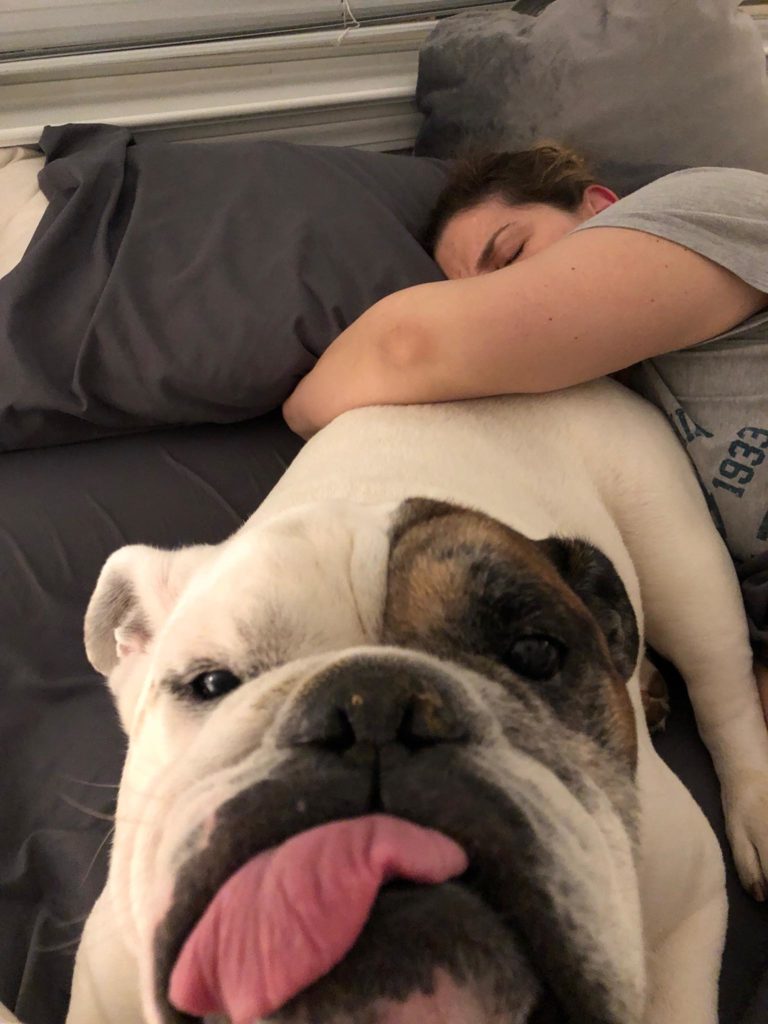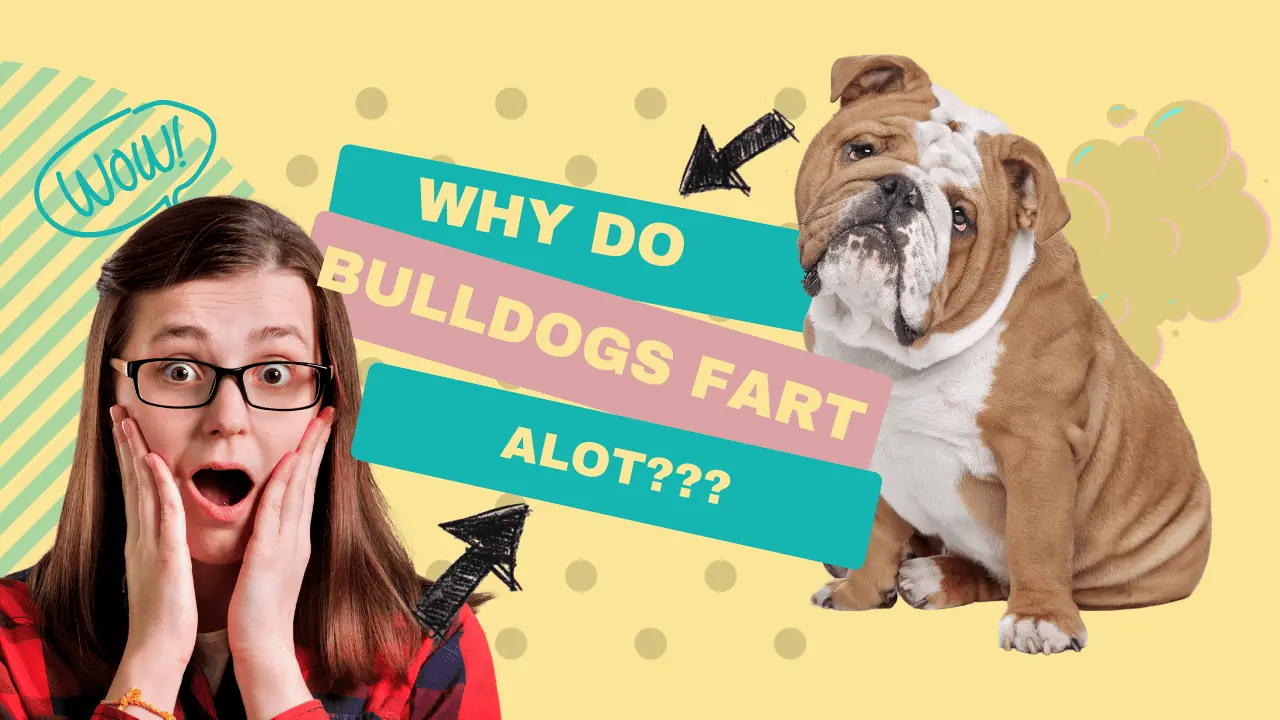Bulldogs are notorious for their flatulence. These lovable, wrinkly dogs may be cute and cuddly, but their gas can clear a room. Do you feel embarrassed when your Bulldog passes gas in public? Don’t worry, you’re not alone. In this article, we will explain why Bulldogs fart so much and some remedies for the problem and ways to prevent if from happening in the first place.
Causes of Bulldog FlatulenceCauses of Bulldog Flatulence
Bulldogs fart more than other dog breeds because of their unique body structure. Bulldogs have a short, wide, and flat snout, which is known as brachycephalic. This snout structure can cause Bulldogs to swallow more air than other breeds, leading to excessive gas. Additionally, Bulldogs have a deep chest and a large abdomen, which can put pressure on their digestive system, leading to flatulence.
Here are 5 reasons bulldogs are one of the smelliest dog breeds in the world.
Carbohydrates: English bulldogs tend to have too many carbohydrates in their diet. This leads to fermenting of the starches and sugars inside the digestive system, which in turn produces gas as a by-product and results in excessive farting.
Food rich in fats and fibers: English bulldogs are susceptible to flatulence when consuming food rich in fats and fibers. This can lead to excessive farting in the breed.
Eating too fast: Bulldogs are known for their voracious appetites, and they often eat their food too quickly. This can cause them to swallow air, which can lead to flatulence.
Dairy Products: English bulldogs may also experience excessive farting when consuming dairy products.
Disease: Diseases such as acute and chronic intestinal ailments may also play a part in causing excessive farting in English bulldogs. Other symptoms such as diarrhea and vomiting, as well as a loss of appetite and weight, may also be observed.
Diet and Flatulence in Bulldogs
Diet also plays a significant role in Bulldog flatulence. Bulldogs tend to have sensitive stomachs and can be prone to food allergies or intolerances. When Bulldogs eat foods that don’t agree with them, it can lead to gastrointestinal issues and excessive gas. Additionally, Bulldogs are notorious for their love of food, and overeating can cause digestive issues and flatulence.
How do you get rid of gas in a bulldog? – treatment Options:
There are several things you can do to reduce your Bulldog’s flatulence. First, ensure that you are feeding your Bulldog high-quality food that is appropriate for its age, weight, and health. Avoid feeding them table scraps or foods that are high in fat or difficult to digest. It is also essential to ensure that your Bulldog is getting enough exercise to keep their digestive system healthy.
You can also try feeding your Bulldog smaller, more frequent meals throughout the day. This will help to reduce the amount of air they swallow while eating and can also help to prevent overeating. Additionally, you can try adding a digestive enzyme supplement (probiotics) to your Bulldog’s food, which can help to break down food and reduce flatulence. Here’s one that we like, Zesty Paws https://prf.hn/l/JzjQ4Ze

What is The Best Food for Gassy Bulldogs?
If you have a bulldog that is prone to flatulence, you may be wondering what type of food is best for their sensitive digestive system. The good news is that there are many options to choose from that can help to reduce gas and promote healthy digestion.
One of the best types of food for a gassy bulldog is a high-quality, easily digestible diet that is free of fillers and artificial ingredients. Look for a diet that is made from high-quality proteins and carbohydrates and is free of by-products and artificial preservatives. Some of the best protein sources for bulldogs include fish, lamb, and hydrolyzed proteins.
When to see a vet?
While flatulence is often a benign problem, there are some cases where it may be a sign of a more serious issue. If your bulldog’s flatulence is accompanied by other symptoms, such as vomiting or diarrhea, or if it’s persistent and doesn’t improve with home remedies, it’s important to take them to the vet for a proper diagnosis.
In some cases, flatulence can be a symptom of a more serious underlying condition, such as inflammatory bowel disease or a gastrointestinal blockage. Your vet can perform tests to determine the cause of your bulldog’s flatulence and recommend an appropriate treatment plan.
How Many Times a Day do Bulldogs Poop?
The frequency of a bulldog’s bowel movements can vary depending on a number of factors, including their diet, age, and overall health. On average, a healthy bulldog can have anywhere from one to three bowel movements a day. However, some bulldogs may go as often as once an hour or as infrequently as once every three days.
It’s important to keep an eye on your bulldog’s bathroom habits and to contact your veterinarian if you notice any changes. A sudden increase or decrease in bowel movements can be a sign of a digestive problem or other health issue.
In order to maintain regular bowel movements, it’s important to feed your bulldog a balanced diet that includes all of the necessary nutrients. You should also make sure that your bulldog is getting enough exercise, as this can help to regulate their digestive system and prevent constipation.
If you’re experiencing difficulties with your bulldog’s bathroom habits, it’s a good idea to talk to your veterinarian. They can help you determine the root cause of any problems and suggest the best course of action.
What Does Healthy Dog Poop Look Like?
A healthy dog’s poop should be firm and well-formed, with a medium to dark brown color. It should have a uniform consistency, not too hard and not too soft, and shouldn’t have any strong or unpleasant odors. In addition, there shouldn’t be any undigested food particles, such as bones or vegetables, in the poop.
If your dog’s sttool deviates from this description, it could indicate a digestive issue or other health problem. For example, very loose or watery stool may indicate diarrhea, while black or very dark brown could indicate internal bleeding. Poop that is unusually small or contains mucus or blood can also be a sign of a problem.
It’s important to pay attention to any changes in your dog’s poop, as it can be a sign of an underlying health issue. If you’re concerned about your dog, it’s best to consult with a veterinarian to get an accurate diagnosis and appropriate treatment.
Final Thoughts:
In conclusion, Bulldogs fart a lot because of their unique body structure and sensitive stomachs. However, there are several things you can do to help reduce your Bulldog’s flatulence. Feeding them high-quality food, providing them with enough exercise, and feeding them smaller, more frequent meals can all help to reduce excessive gas. If you are concerned about your Bulldog’s flatulence or digestive health, be sure to consult with your veterinarian to ensure they are getting the best possible care.
Flatulence in bulldogs can be a common issue, there are steps you can take to reduce the amount of gas your bulldog produces. By making dietary changes, using over-the-counter remedies, and being patient, you can help to keep your bulldog feeling healthy and comfortable.

